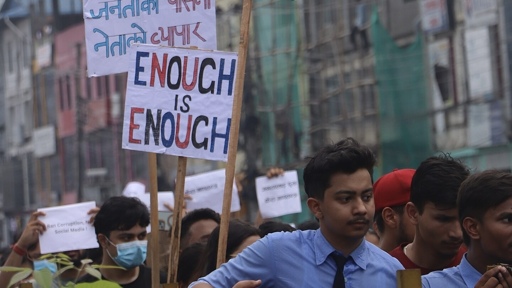Nepalese Prime Minister K P Sharma Oli resigned after violent protests engulfed the country on Tuesday, September 9. He and several of his cabinet colleagues were evacuated to safer places following attacks on their residences and protesters’ attempts to storm the parliament.
As per reports, violent protests took place in cities and towns across the country and a curfew was imposed in most of the urban areas. Protesters targeted and attacked the offices of the ruling parties and residences of their leaders.
The protests were heavily repressed by security forces and on Monday at least 19 people, mostly youth, were killed and over 400 others were injured. Hundreds of security personnel were also injured in the clashes. The violent repression just added fuel to the fire and protests again broke out across the country on Tuesday.
The youth protests
The protests which swept the nation on Monday and Tuesday, were in response to different grievances of the population, especially the youth.
The immediate trigger on Monday was a decision by the government to ban all major social media platforms such as Facebook, WhatsApp, YouTube, X and others in the country last week. The government had claimed the ban was imposed on platforms after they failed to register locally and comply with the local laws.
A youth leader from Nepal told Peoples Dispatch, on the condition of anonymity, that the ban of social media became a major issue because the majority of Nepalese youth uses these platforms not only for entertainment but for several other purposes.
In a country with a significant migrant population abroad, these social media platforms become a primary tool for communication with family members at home, he underlined.
The young protesters also saw “the ban as a symbol of authoritarianism and systemic corruption,” claimed youth activist Madhab Pant.
During Monday’s demonstration, protesters tried to storm the parliament building in Nepal’s capital Kathmandu to demand the resignation of the prime minister. In response, security forces responded by firing rubber bullets and tear gas at them.
Despite the government announcement on Tuesday that it would lift the ban on all social media platforms, the protests continued to spread to new areas.
Oli (73) of Communist Party of Nepal (Unified Marxist-Leninist) was serving his fourth term as prime minister as a head of a coalition of left and centrist Nepali Congress.
The Oli government has been facing pressure from the right wing groups in the country, a section of, which has been lately pushing for the restoration of the Monarchy abolished in 2008.
The post Nepal’s PM KP Sharma Oli resigns amid violent protests appeared first on Peoples Dispatch.
From Peoples Dispatch via this RSS feed


